Share


100% funded by 320 investors
Oysterworld III
Setúbal, PT
instalment
monthly
term
2 years
yearly interest
5.2%
risk rating
C+
Innovative production material and methods for sustainable oyster farming
Description
Oysterworld aims to increase its production capacity to 360 tonnes / year, trough an investment in innovative production material and methods of oyster farming.
The Project needs a global investment of €2.1M to be topped between the years of 2019 and 2020. This investment will be mostly funded by a fund of outright grants called MAR2020, in the amount of €1.07M, the remnant funds will be granted by the company's own capital and through crowdlending.
After the successful funding of Oysterworld I and II, 700.000€ (31% of the total investment) has already been invested and implemented: the cleaning row was acquired, the sorting and calibration of the oysters and the warehouse construction are done, and the photovoltaic panels that generate energy for the whole operation is operating.
This third stage of the investment hopes to complement and fasten the other components, like:
(i) Production equipment (Hexcyl Bags)- The bags and tables are necessary to accommodate the oyster growing.
(ii) Soil transactions
(iii) Floodgates
(iv) Supporting equipment (mini-dredge, backhoe, oysters tables and sizing machine)
(v) Payment of the selector- The selector is an essential investment in the oyster farming which enables the separation of the product by weight (calibers)
The Impact
The oyster extraction sector is mainly settled in traditional techniques and intensive labour and that is why Oysterworld, which positions itself as one of the most innovative in the sector in Portugal, is looking to use new technological methods which, not only will assure its competitiveness in a growing market, but also ensure better work conditions and a better product.
This project has a very positive social and environmental impact contributing to:
- Sustainable production and consumption: Oyster farming has a positive impact in the marine environment, as it improves water quality by acting as a filter (a single oyster filters on average 55 litres of water a day), it reduces the need for extractive fishing and it does not interfere with the natural stocks.
- Gender equality: the fishing labour sector is mainly occupied by men. This is mainly due to the low level of mechanization and automation that requires the use of strength. This project opens doors for hiring women. In fact, 50% of Oysterworld’s current employees are women.
- Better working conditions: the tasks required for oyster production are physically challenging, often leading to injuries, skin burns, other wounds or physical exhaustion. The improvements brought by this technique will reduce the employees’ physical exhaustion, increasing their productivity. Also, the company pays salaries above the average within the sector.
- Community sustainability: the people in the surrounding communities mostly work in seasonal jobs, connected to agriculture. Oyster production is supplying a steady job.
“This is a unique project that combines the positive environmental impact with the growth of a value-added industry, with potential for export and job creation in local communities", explains Nuno Brito Jorge, CEO of Goparity.
Contribution to the Sustainable
Development Goals
Sustainable Development Goals
.4efc673.png)
The Promoter
About OYSTERWORLD, LDA.
Founded by the current shareholder and Head of Production, Francisco Bernardino, Oysterworld is dedicated to the sustainable production of oysters. Francisco and his partner, Lopo Rocha, have more than 10 years of experience in the oyster industry. The company owns an area of 18 ha in Setúbal and has 16 employees, including biologists, chemical and mechanical engineers, pathologists and financial experts. For the development of its activity, the company owns two ships - Canes and Alcaçarenha & Cobelos, located in Setúbal. They have a combined area of more than 20 hectares and are located in the Sado Estuary Nature Reserve. The peculiarity of these waters makes them ideal for the development of oyster farming, mainly with regard to hydrographic conditions (tides), saline levels and the richness of the phytoplankton.
The team
Francisco has a master's degree in Marine Biology and has spent his entire career in the sector, undertaking various consulting projects and participating in 2 aquaculture startups. Throughout his career, he has had the opportunity to develop offshore production projects for both bivalves and fish, conduct aquaculture feasibility studies, and design oyster production circuits, among other projects. It is also noteworthy that Francisco has 11 years of experience at the Directorate General of Fisheries (currently DGRM) as a senior aquaculture technician, and has represented Portugal's interests before the European Commission.
Business Model
Oysterworld has been dedicated to sustainable bivalve farming, namely oysters, for 7 years. The company has a share capital of 400.000€ and exports most of its production to European countries, mainly to Spain, France and the Netherlands. The market they operate in is characterized by high demand and lack of supply (selling 100% of the production in recent years) and it has a great international potential (over 90%). Their value proposition is mainly focused on selling a high quality product not only for the applied production methods, but also for the species, which is greatly accepted in the market with a very competitive price that guarantees that 100% of the production is sold even in years where the production is greater. On top of this, they have an independent strategy by never relying on any single client for more than 20% of the company’s sales.
Active since
2013
Fiscal country
PT
Operating In
Setúbal
Industry
Aquaculture
Number of Goparity Loans
3
Women Shareholders
No
Website
http://oysterworld.pt/Updates
2021-10-25
Change in risk classification
This project has received the risk classification R, due to the fact that its loan restructuring (which happened on January 21st 2021) implied an increase of the loan term of at least 12 months.
2021-01-21
Loan terms were restructured
2020-02-20

Project Photographs
2019-12-24
Campaign's extension
The campaign's end date was extended one more week and its goal amount was adjusted to 117.500€
2019-10-25
Open for investment
Sign up to our newsletter and stay up-to-date on our investment opportunities






